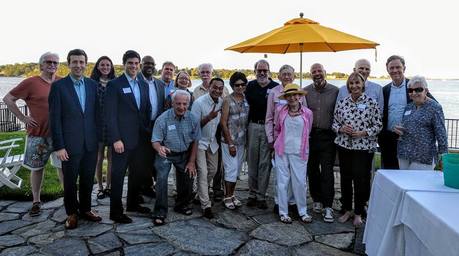
CT Citizen Research Group's E. D. Ann Pratt is participating in the New England Climate Ride from Bar Harbor to Boston, Sept 12th thru the 16th to help raise funds to strengthen our organizing capacity in Connecticut- and to make sure one more state is on a clear, strong path towards a Zero Carbon Future.
Make your secure, online donation to this effort today by clicking on Ann's 'Support Me' button. You'll automatically receive an acknowledgment, we will be notified by email of your support and you will be kept updated on Ann's ride for our lives!
Donations go to the Connecticut Citizen Research Group, are tax deductible, and support both CCRG and CCAG's organizing work on this issue.
View our current Climate Agenda here.
The health of our planet, economy, and communities is at stake. Right now, it is more important than ever to work toward a sustainable future. A great way that you can help do something meaningful, substantial and concrete is to donate to this effort TODAY!
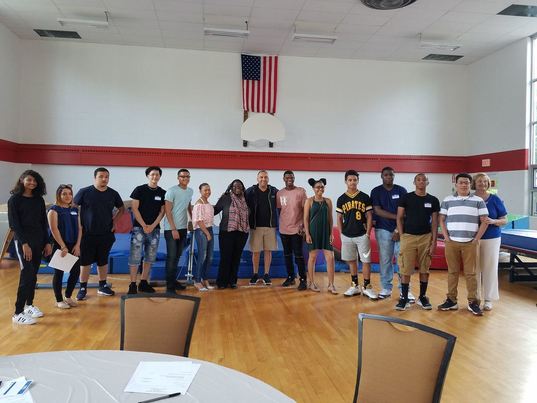
Youth Leaders In Training
On October 7th, these young people
learned how to lead others in engaging
with government to make a better world. There is nothing like the energy of excited students realizing they can make a real difference! Kudos to CCAG Organizer Ann Pratt, who led this all-day adventure at the Naugatuck Community College (Waterbury Campus).
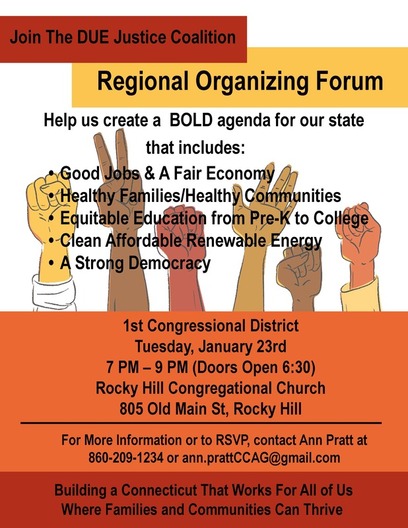
Join the DUE Justice Coalition for regional organizing sessions bringing together individuals, labor, faith, advocacy and community organizations to build and advance a bold agenda for a Connecticut That Works For All- Not Just the Few.
Haven't registered yet? Scroll down for details for each Congressional District then RSVP for yours!
ON THE AGENDA:
Economic Justice & A Fair Economy
Education Equity- From Pre-K to Adulthood
Environmental Justice & A Sustainable, Renewable Economy
Health Care for All
Racial, Gender & Ethnic Justice
Democracy
DATES-TIMES-LOCATIONS: Regional Organizing Sessions
Haven't registered yet? Scroll down for details for each Congressional District then RSVP for yours!
ON THE AGENDA:
Economic Justice & A Fair Economy
Education Equity- From Pre-K to Adulthood
Environmental Justice & A Sustainable, Renewable Economy
Health Care for All
Racial, Gender & Ethnic Justice
Democracy
DATES-TIMES-LOCATIONS: Regional Organizing Sessions
- 1st CD Tues, January 23rd 7PM Rocky Hill Congregational Church 805 Old Main St., Rocky Hill
- 3rd District Thurs, January 25th 7 PM First United Church- Milford CT 34 West Main St, Milford
- 4th District Wed, January 30th 7 PM Norwalk Community College 188 Richards Ave, Norwalk
- 2nd District Wed, January 31st Mitchell College 437 Pequot Ave, New London To be confirmed
- 5th District Thu, Feb 1st7 PM Naugatuck Valley Community College, 750 Chase Parkway, Waterbury To be confirmed

Last year - the CT General Assembly changed eligibility levels for the Medicare Savings Program (MSP) impacting 113,000 seniors & people with disabilities. Legislators also cut over 13,000 low income parents off of all of their health care coverage under HUSKY A- limited access to dental services for all adults on Medicaid and cut reimbursement for primary care providers.
CT's Medicaid program provides essential healthcare & benefits to approximately 800,000 CT residents- including elderly, low-income parents & people with disabilities -- vital assistance that if changed as proposed, would leave the healthcare of thousands of our neighbors in jeopardy.
The Good News- because YOU spoke up and showed up at the Capitol, called your legislators, wrote Op-Eds and made sure our voices were heard, the CT General Assembly reversed their decision and rescinded the cuts to MSP.
The Bad News This fix was only temporary. As it stands, our state's most vulnerable citizens are scheduled to lose their benefits on July 1, 2018- and the cuts to HUSKY A parents, dental benefits & primary rates still stand.
But as we saw in December, when we fight back, WE CAN WIN.
That's why your voice, your presence and your actions are needed now more than ever before. Together we can stop these reckless cuts to MSP and Husky A and keep Connecticut families health, safe and secure.
Please join us on Wednesday, Feb. 21st at 4pm in Hartford at the Capitol- RM 310 to discuss how we can work to prevent these damaging and hurtful cuts and protect CT's signature health care program and our most vulnerable citizens.
Directly following our meeting, the General Assembly's Appropriations Committee will host a Public Hearing at 6pm, where together we'll MAKE sure that our elected officials understand that CT residents OPPOSE any cuts to Medicaid and are calling for FULL RESTORATION OF MEDICAID COVERAGE!
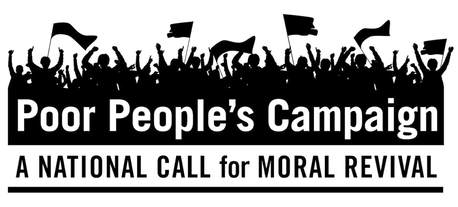
Uniting tens of thousands of people across the country to challenge the evils of systemic racism, poverty, the war economy, ecological devastation and the nation’s distorted morality. Read more here.
Please join us in Connecticut for week 5 of the national campaign and call to action. RSVP today!
When: Monday, June 11th - 3PM
Where: At the CT State Veteran's Memorial @ Minuteman Park (in front of the Legislative Office Bldg.) Get directions.
This week's action will put a:
SPOTLIGHT ON GOOD JOBS & FAIR WAGES
SPOTLIGHT ON HOUSING
SPOTLIGHT ON EDUCATION
IMAGES OF BBQ'S PAST

Saturday, June 23rd - 3 to 6 pm - At the Home of Hosts Pat Rehmer and Rep. Peter Tercyak
150 Belridge Rd. New Britain, Connecticut
In support of the CT Citizen Action Group
Don't forget to share this event with family & friends! Share on FB. Download the flyer here.
Looking forward to seeing you out in the backyard! RSVP today!
For questions, to volunteer, bring a dish or to RSVP offline, email [email protected] or call Duste Dunn at: 203-241-8403
150 Belridge Rd. New Britain, Connecticut
In support of the CT Citizen Action Group
Don't forget to share this event with family & friends! Share on FB. Download the flyer here.
Looking forward to seeing you out in the backyard! RSVP today!
For questions, to volunteer, bring a dish or to RSVP offline, email [email protected] or call Duste Dunn at: 203-241-8403
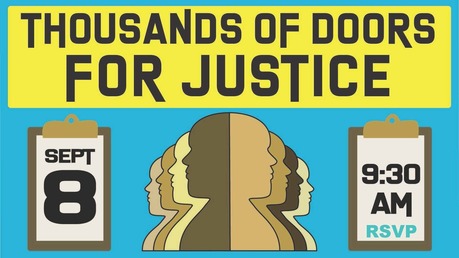
#DoorsForJustice DAY OF ACTION- For activists and volunteers who are committed to justice!!
Good Jobs-Fair Wages; Access to Quality Public Education; A Vibrant & Fairly Funded Public Sector; Racial, Gender and Immigrant Justice; Democracy in our State and in Our Work Places; Healthy Communities & Environmental Justice.
We will be knocking on doors, making calls, registering voters, training volunteers and recruiting new activists. We all contribute in the best ways we can & embrace our collective struggle. For updates, locations and actions across the state. RSVP today!
Good Jobs-Fair Wages; Access to Quality Public Education; A Vibrant & Fairly Funded Public Sector; Racial, Gender and Immigrant Justice; Democracy in our State and in Our Work Places; Healthy Communities & Environmental Justice.
We will be knocking on doors, making calls, registering voters, training volunteers and recruiting new activists. We all contribute in the best ways we can & embrace our collective struggle. For updates, locations and actions across the state. RSVP today!

CCAG E.D.Tom Swan has agreed to throw himself into the fire in support of the Connecticut Citizen Action Group. Help us to honor his sacrifice, join us for the party!
At the Home of Host Elaine Jorgensen-Lang
Saturday, September 22nd, 2018 3 to 6 pm
12 Musket Trail, Simsbury CT
RSVP for directions and details.
Ticket price includes: BBQ & all the trimmings, beverages and show. Donations to CCAG are not tax deductible.
Panel of Roasters and Toasters: Bill Bloss, Chris Donovan, Lynne Ide, David Pudlin, Ethan Rome, Bilal Sekou
Host and Program Committee: Donna Becotte, Bill Bloss, Beverley Brakeman, Marc Caplan, Isabel Carrasquillo, Bill Collins, Steve Derby, David Desiderato, Hillary Desideraggio, Chris Donovan, Wendy Fields, Fletcher Fischer, Rep. Gregory Haddad, Suzanne Havilland, Lynne Ide, Steve Wanczyk-Karp, Diane Keefe, Rep. Matt Lesser, John Levin, Judy Maslen, "Terrible" Bernie McKinnon, David McCluskey, Max Medina, Rick Melita, John Murphy, The Honorable Edith Prague, David Pudlin, Jake Pudlin, Sam Pudlin, Cheri Quickmire, Miles Rapoport, Ethan Rome, Amy McLean Salls, Peggy Shorey, Rep. Peter Tercyak, Steve Thornton, Gretchen Vivier
CCAG E.D.Tom Swan has agreed to throw himself into the fire in support of the Connecticut Citizen Action Group. Help us to honor his sacrifice, join us for the party!
At the Home of Host Elaine Jorgensen-Lang
Saturday, September 22nd, 2018 3 to 6 pm
12 Musket Trail, Simsbury CT
RSVP for directions and details.
Ticket price includes: BBQ & all the trimmings, beverages and show. Donations to CCAG are not tax deductible.
Panel of Roasters and Toasters: Bill Bloss, Chris Donovan, Lynne Ide, David Pudlin, Ethan Rome, Bilal Sekou
Host and Program Committee: Donna Becotte, Bill Bloss, Beverley Brakeman, Marc Caplan, Isabel Carrasquillo, Bill Collins, Steve Derby, David Desiderato, Hillary Desideraggio, Chris Donovan, Wendy Fields, Fletcher Fischer, Rep. Gregory Haddad, Suzanne Havilland, Lynne Ide, Steve Wanczyk-Karp, Diane Keefe, Rep. Matt Lesser, John Levin, Judy Maslen, "Terrible" Bernie McKinnon, David McCluskey, Max Medina, Rick Melita, John Murphy, The Honorable Edith Prague, David Pudlin, Jake Pudlin, Sam Pudlin, Cheri Quickmire, Miles Rapoport, Ethan Rome, Amy McLean Salls, Peggy Shorey, Rep. Peter Tercyak, Steve Thornton, Gretchen Vivier
Thank you to the 2018 CCAG Awardees, Speakers, Presenters, Host Committee, Donors, Arts Community and Volunteers for making our 47th Anniversary Celebration a night to remember!
This years awardees:
Bill Collins & Tish Gibbs
The Nancy Benedict Social Justice Award!
Eva Bermúdez Zimmerman
The Laddie Michalowski Community & Labor Award!
Host Committee and Table Captains:
Stephen Anderson Pres. CSEA SEIU Lcl. 2001, Pedro Bermúdez, Hartford City Councilwoman Wildaliz Bermúdez, Bill Bloss, Bryan Bonina Pres. Congress of CT Community Colleges, Beverley Brakeman Dir. UAW Region 9A, Atty. Ed Camacho, Isabel Carrasquillo, Steve Derby, Susan Goldman, Kimberly Glassman, Scott Harris, Juan Hernandez Dist. Leader 32BJ SEIU, Steve Wanczyk-Karp, Diane Keefe, Elaine Lang, John Levin, Dan Livingston, Amy McLean-Salls CT Dir. Acadia Center, Bernie McKinnon, Max Medina, Dave Moore, John Murphy, Hank Murray, Bishop John Selders, Rep. Edwin Vargas, Sylvia Vargas, Pastor Rodney Wade- Long Hill Bible Church, Stacey Zimmerman
This years awardees:
Bill Collins & Tish Gibbs
The Nancy Benedict Social Justice Award!
Eva Bermúdez Zimmerman
The Laddie Michalowski Community & Labor Award!
Host Committee and Table Captains:
Stephen Anderson Pres. CSEA SEIU Lcl. 2001, Pedro Bermúdez, Hartford City Councilwoman Wildaliz Bermúdez, Bill Bloss, Bryan Bonina Pres. Congress of CT Community Colleges, Beverley Brakeman Dir. UAW Region 9A, Atty. Ed Camacho, Isabel Carrasquillo, Steve Derby, Susan Goldman, Kimberly Glassman, Scott Harris, Juan Hernandez Dist. Leader 32BJ SEIU, Steve Wanczyk-Karp, Diane Keefe, Elaine Lang, John Levin, Dan Livingston, Amy McLean-Salls CT Dir. Acadia Center, Bernie McKinnon, Max Medina, Dave Moore, John Murphy, Hank Murray, Bishop John Selders, Rep. Edwin Vargas, Sylvia Vargas, Pastor Rodney Wade- Long Hill Bible Church, Stacey Zimmerman
|
Thank you to everyone who raised a glass, and supported us for Sunset on the Beach! Your donations are hard at work today!
Host Committee: Bill Collins, Bill Bloss, Jim Dean, Tish Gibbs, Francine Goldstein, Senator Ed Gomes, John Hartwell, Diane Keefe, Ned Lamont, Max Medina, Douglas and Terry Sutherland Proceeds benefitted the Connecticut Citizen Action and Research Groups. |
Eversource asked to drop 16 percent gas rate hike CT Post By: BILL CUMMINGS May 21, 2018 "The public policy behind the rate request is wrong for ratepayers and wrong for the company over the longer term," said Tom Swan,
"We call on Eversource to rethink this strategy and do the right thing," Read more...
"We call on Eversource to rethink this strategy and do the right thing," Read more...
ICE Protest Shuts Down Main Street, 35 Arrested CT News Junkie By: CHRISTINE STUART July 2, 2018
Tom Swan, executive director of the Connecticut Citizens Action Group, said clearly ICE is not working and it makes sense that it should be abolished. Read more...
Tom Swan, executive director of the Connecticut Citizens Action Group, said clearly ICE is not working and it makes sense that it should be abolished. Read more...
CLIMATE & CLEAN ENERGY PRIORITY SOLUTIONS 2018-
Working Group: Acadia Center • Audubon Connecticut • Center for Energy Security Solutions • Connecticut Citizen Action Group • Citizens Campaign for the Environment • Clean Water Action • Connecticut Fund for the Environment • Connecticut League of Conservation Voters • ConnPIRG • Connecticut Roundtable on Climate and Jobs • Consumers for Sensible Energy • Environment Connecticut • Northeast Clean Energy Council • Renew Northeast • Save the Sound • Sierra Club • Solar Connecticut • The Nature Conservancy • Vote Solar
Right now Connecticut faces two fundamental challenges: First, the need to strengthen our economy through generation of revenue and well-paying jobs for the state; and second, a need to slash greenhouse gas emissions in all sectors of our economy to stem the impacts of climate change. A policy framework that will drive transformative change toward a clean energy economy will allow us to tackle both of these challenges. The solutions needed to combat climate change can and will save money and grow jobs, and help Connecticut out of its ailing budget problems.
The good news is that Connecticut has a proven track record of leadership when it comes to climate action and green-economy innovation. The bad news is that the state is at a crossroads for progress. Connecticut’s greenhouse gas (GHG) emissions have been rising for the last few years, not falling. Worse yet, in 2017 the legislature further endangered our progress by raiding tens of millions of dollars of clean energy and energy efficiency funds, which are critical for programs that reduce our emissions, lower electric bills, and create thousands of jobs. We need to stop this regression and take decisive steps to scale up access to renewable energy and energy efficiency for our residents, businesses and government.
There are four steps on the path to climate action that Connecticut legislators can take in 2018 to help ensure we meet the 2020 and 2050 emission mandates.
I. ENSURE ACCOUNTABILITY IN CLIMATE CHANGE PLANNING
II. PROTECT INVESTMENTS IN ENERGY EFFICIENCY
Energy Efficiency, Clean Energy & RGGI Funds- Solution: Protect the Energy Efficiency, Regional Greenhouse Gas Initiative, and Green Bank funds. These critical funds must be protected through renewed support of Connecticut’s national award winning residential and commercial Energy Efficiency programs and the Green Bank Financing programs. Energy efficiency and clean energy investments are critical to Connecticut’s fiscal and environmental health.
III. INCREASE RENEWABLES TO BUILD A SUSTAINABLE FUTURE WITH GREEN JOBS
IV. CUT FOSSIL FUELS TO PROTECT OUR CLIMATE
Natural Gas Infrastructure Solution: Proposed legislation would fix this problem by protecting utility customers from being forced to subsidize the cost of interstate natural gas pipeline construction.
Working Group: Acadia Center • Audubon Connecticut • Center for Energy Security Solutions • Connecticut Citizen Action Group • Citizens Campaign for the Environment • Clean Water Action • Connecticut Fund for the Environment • Connecticut League of Conservation Voters • ConnPIRG • Connecticut Roundtable on Climate and Jobs • Consumers for Sensible Energy • Environment Connecticut • Northeast Clean Energy Council • Renew Northeast • Save the Sound • Sierra Club • Solar Connecticut • The Nature Conservancy • Vote Solar
Right now Connecticut faces two fundamental challenges: First, the need to strengthen our economy through generation of revenue and well-paying jobs for the state; and second, a need to slash greenhouse gas emissions in all sectors of our economy to stem the impacts of climate change. A policy framework that will drive transformative change toward a clean energy economy will allow us to tackle both of these challenges. The solutions needed to combat climate change can and will save money and grow jobs, and help Connecticut out of its ailing budget problems.
The good news is that Connecticut has a proven track record of leadership when it comes to climate action and green-economy innovation. The bad news is that the state is at a crossroads for progress. Connecticut’s greenhouse gas (GHG) emissions have been rising for the last few years, not falling. Worse yet, in 2017 the legislature further endangered our progress by raiding tens of millions of dollars of clean energy and energy efficiency funds, which are critical for programs that reduce our emissions, lower electric bills, and create thousands of jobs. We need to stop this regression and take decisive steps to scale up access to renewable energy and energy efficiency for our residents, businesses and government.
There are four steps on the path to climate action that Connecticut legislators can take in 2018 to help ensure we meet the 2020 and 2050 emission mandates.
- First, commit to timely targets for GHG (Green House Gas) reductions that ensure accountability.
- Second, bolster strategic investment and asset protection of energy efficiency and clean energy, because the cheapest and cleanest energy is the energy you don’t use.
- Third, ramp up renewable resources. There are several parts in this step, but two major components include expanding the Renewable Portfolio Standard and removing barriers to the rapid deployment of renewable energy.
- Fourth, cut fossil fuel use that contributes to climate change. This means reducing reliance on natural gas, not expanding it, and slashing emissions from transportation by electrifying our cars and trucks.
I. ENSURE ACCOUNTABILITY IN CLIMATE CHANGE PLANNING
- Global Warming Solutions Act: Amendments to the GSWA would set a new interim GHG reduction target for 2030 – requiring a 45% reduction below 2001 emissions levels by 2030, as recommended by the Governor’s Council on Climate Change (GC3).
- Fix Ratepayer Impact Statement- Solution: If OFA is going to be required to evaluate short-term cost impacts to ratepayers of new bill proposals, then they should also be mandated to evaluate long-term, life-cycle cost impacts and benefits of any proposed programs. This should include an evaluation of climate impacts (e.g. systemic health, and environmental effects that impact climate change), including any proposal’s impact on Connecticut’s ability to meet mandated GHG levels under the GWSA.
II. PROTECT INVESTMENTS IN ENERGY EFFICIENCY
Energy Efficiency, Clean Energy & RGGI Funds- Solution: Protect the Energy Efficiency, Regional Greenhouse Gas Initiative, and Green Bank funds. These critical funds must be protected through renewed support of Connecticut’s national award winning residential and commercial Energy Efficiency programs and the Green Bank Financing programs. Energy efficiency and clean energy investments are critical to Connecticut’s fiscal and environmental health.
III. INCREASE RENEWABLES TO BUILD A SUSTAINABLE FUTURE WITH GREEN JOBS
- Renewable Energy Portfolio Standard (RPS)- Solution: Extend the RPS to require electric suppliers to increase the source of energy they supply from Class I renewable energy sources to achieve at least 50% Class I renewable energy sources by 2030. This will also add more jobs to Connecticut and New England and reduce reliance on natural gas, which will allow consumers to avoid volatile winter spikes in electricity prices, and will eliminate the need for expensive interstate pipeline infrastructure.
- Community Shared Solar Solution: Legislation to expand solar access to a broader group of energy consumers—including low and moderate-income families, businesses, and municipalities—through a full-scale community shared clean energy program.
- Virtual Net Metering Solution: Lift the current cap of $10 million to expand access, especially for governmental users, as a means of relieving budget burdens through cost-effective adoption of renewable energy while advancing economic development, job creation and energy security.
- Offshore Wind Expansion Solution: Increase Connecticut’s authority to procure offshore wind, and mandate 1000 MW of capacity by 2030 and 2000 MW by 2035 (when the operating license of Millstone’s Unit 2 expires). As part of the mandate, the legislature should require that offshore wind proposals describe plans for using skilled labor and apprenticeship programs registered in Connecticut to ensure that the economic benefits of offshore wind development accrue to Connecticut. To facilitate timely buildout of offshore wind, the legislature should also set a timeline for DEEP to solicit bids: 200 MW every 2 years through 2030 and 500 MW every 2 years after 2030.
IV. CUT FOSSIL FUELS TO PROTECT OUR CLIMATE
Natural Gas Infrastructure Solution: Proposed legislation would fix this problem by protecting utility customers from being forced to subsidize the cost of interstate natural gas pipeline construction.
2018 Legislative Agenda- Session Ends At Midnight on May 9th!
Restoration of HUSKY A: Right now 13,000 low income working parents with HUSKY A (Medicaid) health care coverage will lose their coverage on January 1, 2019 if legislators don’t act by midnight on May 9.
The latest versions of both parties budget proposals fully fund the Medicare Savings Program (MSP). MSP helps low-income elderly individuals and people with disabilities on Medicare pay their out-of-pocket costs and Medicare Part B premiums.
While neither budget restores the cuts to HUSKY A parents, today there is some indication that some legislators have been listening! (See this article). On May 5th, advocates held a press event to highlight the threats to Medicaid coverage and spoke to legislative leaders about HUSKY A cuts. Check out video coverage here or read about it here.
Time is running out and we need calls to leadership of the House and Senate now! Contact: Senator Len Fasano (1-800-842-1421) & Representative Themis Klarides (860-240-8700). Tell them to put HUSKY A in the budget!
HB 5210: Covering Essential Health Benefits for Women, Children and Adolescents. It’s not news that actions in D.C that seek to erode the protections of the Affordable Care Act (ACA) have an impact on people in Connecticut. That’s why CCAG, consumer advocates and some state legislators are working to make sure Connecticut residents are protected against paying for health plans that won’t give them the care they need.
The bill passed the House on a bipartisan vote of 114-32 and now awaits action in the Senate. Passed
Senate! Headed for the Governors Desk.
HB 5463 The Study of a Medicaid Public Option is an important first step in finding ways to offer affordable health care to Connecticut residents who can’t use Medicaid or Medicare.
This bill passed the House by a vote of 93-55. The Senate has yet to act. Call your state Senator (find here) and Senate leadership: Senator Martin Looney, 860-240-0375 - Senator Len Fasano, 800-842-1421. Tell them to take up and pass HB 5463 before the legislature adjourns on Wednesday May 9th.
HB 5384 An Act Limiting Changes to Health Insurers’ Prescription Drug Formularies.
This bill protects health consumers from insurers’ attempts to take away essential life-saving coverage for needed prescription drug treatments. It is vital for the state of Connecticut to change the rules of the game by holding pharmaceutical corporations, PBM’s and insurance companies accountable to providing reasonable, ethical health insurance coverage and products, and without excessive profit taking and price gouging of Connecticut residents.
The amended version of HB 5384 passed the house unanimously. (See article) and now the Senate must act. Call now to urge adoption of this bill. Find your Senator here.
DEMOCRACY
SB 5421 The National Popular Vote. Our state can lead the way in ensuring that voters in all 50 states have a say in picking the President. The National Popular Vote will let us reform the broken Electoral College and ensure presidential candidates compete for every single voter -- not just those in "battleground states." Passed and Governor is expected to sign! Thank you to everyone for all of the hard work!
HJ No.28 State Constitutional Amendment to Permit Early Voting. Did you know Connecticut is one of only 13 states that doesn’t allow early voting? Because early voting is prohibited by the state constitution, the legislature must vote to allow a referendum that then enables an early voting law to be considered. It’s a multi-year effort that passed the house on April 19th and is currently stalled in the Senate. Details on this issue available here.
Please call the Senate presidents, and your Senator, right now to urge that they vote yes on the Early Voting Amendment. Senate Democratic President Martin Looney 860.240.0375 Senate Republican President Len Fasano 860.240.8871
Your senator (look up here) If after hours, leave a message or email.
ENVIRONMENT
SB 9 AAC Connecticut’s Energy Future. While there are aspects of the proposed bill that could move the state forward, we find many parts to be disappointing.
Increase Renewables to Build a Sustainable Future with Green Jobs. The following solutions are on the table:
- Renewable Energy Portfolio Standard (RPS). Extend the RPS to require electric suppliers to increase the source of energy they supply from Class I renewable energy sources in order to achieve at least 50% Class I renewable energy sources by 2030. This will also add more jobs for Connecticut and New England, and will reduce reliance on natural gas.
- SB 336 AAC Community Shared Solar. Legislation to expand solar access to a broader group of energy consumers—including low and moderate-income families, businesses, and municipalities through a full-scale community-shared clean energy program.
- Virtual Net Metering. Lift the current cap of $10 million to expand access, especially for governmental users, as a means of relieving budget burdens through cost-effective adoption of renewable energy, while advancing economic development, job creation and energy security.
- Offshore Wind Expansion. Increase Connecticut’s authority to procure offshore wind, and mandate 1000 MW of capacity by 2030 and 2000 MW by 2035 (when the operating license of Millstone’s Unit 2 expires). As part of the mandate, the legislature should require that offshore wind proposals describe plans for using skilled labor and apprenticeship programs registered in the state in order to ensure that the economic benefits of offshore wind development accrue to Connecticut.
SB 336 AAC Community Shared Solar. Legislation to expand solar access to a broader group of energy consumers—including low and moderate-income families, businesses, and municipalities through a full-scale community-shared clean energy program.Contact your State Representative to support! Find your Rep. here.
SB 332 AAC Solicitation for Natural Gas Transportation Capacity. Proposed legislation would fix this problem by protecting utility customers from being forced to subsidize the cost of interstate natural gas pipeline construction.
SB 103 AAC Hydraulic Fracturing Waste in Connecticut. After hard work from a strong coalition of environmental leaders, the initial bill has been greatly strengthened. The bill now includes ALL of the language that is included in the local ordinances passed in 42 towns across the state. Please call your legislators and ask them to co-sign and support this bill.
EDUCATION
SB 4 An Act Equalizing Access to Student-Generated Financial Aid. The C4D Movement had a fantastic victory! This bill passed and was signed by the Governor.
ECONOMIC JUSTICE
HB 5388 Raising the Minumum Wage. Raising the minimum wage would increase wages for workers AND raise revenue for the state. As workers earn more, theypay more in income taxes because they have more disposable income to spend in the local economy. That drives local economic activity, stimulates business growth and generates new sales tax revenue. Wages have stagnated and corporate profits are at record highs. It’s far past time that Connecticut does more to help working people get ahead.
Contact your state representative and state senator urging them to not only support raising the minimum wage, but to demand leadership call it up for a vote here.
HB 5387 Paid Family Leave. Too many families in our state face financial penalty when they need to take time off from work to care for a loved one, welcome a baby, or recover from an illness. The time is NOW for paid family and medical leave. Contact targeted legislators and leadership to support paid leave before May 9. Contacts and sample scripts are here.
Summer 2018 Special Campaign - Protecting Climate, Jobs and Consumers
Right now Connecticut faces three challenges: the need to strengthen our economy, to stem the impacts of climate change, and to ensure that consumers are protected.
The good news is that we have a track record of leadership when it comes to tackling these multi- issue challenges. The following are some of the issues we are pursuing as a part of our special campaign to build on past victories and to reverse harmful decisions made at the state capitol. Read about this campaign here.
The 2018 CCAG Legislative Wrap Up - Victories & more work to do.
PROTECTING HEALTHCARE
In the fall of 2017, the state legislature voted to decrease income eligibility for parents and caregivers in the Medicaid (HUSKY A) program, as well as elderly and disabled people in the Medicare Savings Program (MSP), in order to balance the state budget. Advocates and activists mounted a campaign to keep the cuts from going into effect and restore health care coverage to those at risk of losing it. Thanks to a hard-fought victory in the final hours of the 2018 legislative session, over 115,000 low-income, working parents, elderly and persons with disabilities will continue to have access to Medicaid coverage.
HB 5210 Covering Essential Health Benefits for Women, Children and Adolescents. It’s not news that actions in D.C that seek to erode the protections of the Affordable Care Act (ACA) have an impact on people in Connecticut. That’s why CCAG, consumer advocates and some state legislators worked to make sure Connecticut residents are protected against paying for health plans that won’t give them the care they need. HB 5210 is an excellent bill that ensures that a defined batch of basic essentials must be covered for women, children, and adolescents. The ten Essential Health Benefits protected include: hospitalization, pediatric care, prescription drugs, maternity care, preventive & wellness services, emergency services, rehabilitative services, mental & behavioral health services, laboratory services and ambulatory patient services.
The bill also protects a few more things required by the ACA: preventive services, insurance companies cannot deny coverage to people with pre-existing conditions and, insurance companies cannot cap the amount they will spend on a patient in a year or over a lifetime.
HB 5384 AAC Prescription Drug Costs. This bill is an important first step in dealing with one of the key drivers of rising health care costs – prescription drugs. It requires drug companies, pharmacy benefit managers (PBMs) and insurance companies to provide previously inaccessible information to the state. The new law adds much-needed transparency to pricing and availability of drugs, while limiting the ability of all three profit centers to quietly manipulate the list at our expense.
Although this bill makes good progress, it isn’t perfect. The bill is stronger on PBM and insurance company transparency than it is on getting more information from drug companies about why they have raised their prices. And we would have liked the provision to pass rebates along to consumers at the pharmacy counter to have survived. The bill passed the 149-0 and the Senate 36-0.
HB 5463 AAC the Study of Health Insurance Options for Individuals Ineligible for Medicaid. This bill would have laid out a specific pathway to offer Medicaid as a public option for purchase by anyone in the state. Pressure from CCAG members helped it pass the House 93 to 55, which is no small thing! However, the Senate did not call it to a vote this year. CCAG and allies WILL continue the pressure until Connecticut has a public option to offer.
DEMOCRACY
HB 5421 The National Popular Vote. A victory and a big one! The National Popular Vote will let us reform the broken Electoral College and ensure presidential candidates compete for every single voter -- not just those in "battleground states." With enough states in favor, the national popular vote will become binding. Long fight. Fundamental reform. Extreme importance. Thank you, Legislature! HB 5421 passed both chambers and was signed by the Governor on May 24, 2018.
Net Neutrality. If you aren't worried you aren't paying attention! Big Telecom lobbyists think their grip on our political system is so strong that we can't win, but this movement keeps surprising them. With enough pressure, we can do it again.
In Connecticut the measure, passed in the Senate 18-18 with Lt. Governor Wyman breaking the tie but with industry lobbyist swarming the capitol there weren’t enough votes to get it past the House. This bill would have helped preserve an open internet, and enshrine the concept of net neutrality into state statute.
Moving forward, other states are pushing their own net neutrality laws and rules in defiance of the recent FCC’s repeal, heightening the possibility that supporters will be waging another legal battle over the popular Obama-era regulations. The FCC’s repeal order included a provision preempting states from creating their own net neutrality rules, and this movement could lay the groundwork for a court battle over states’ rights to implement their own consumer protections.
ECONOMIC JUSTICE
HB 5388 Leadership did not call this for a vote. They should have. The bill would have raised the minimum wage. First, the minimum wage has not even kept pace with inflation. Second, putting money in the pockets of lower echelon workers stokes the economy to a far greater degree than adding to the already bursting personal vaults of the rich. (See the GOP federal tax cuts.) Income inequality is possibly the most urgent economic issue of the day.
HB 5387 This bill was not given a vote, and would have established Paid Family Leave for workers at companies above a certain size. Sooner or later, the US catches up with the rest of the industrialized world on this issue. But not this year.
ENVIRONMENT
SB 9 This bill, titled “CT’s Energy Future,” passed but CCAG opposed. Although it did do some good things. We could not fully support it because it placed a cap on commercial solar and failed to include net metering. Net metering allows consumers/producers who generate energy by renewables to sell excess energy into the grid for universal access. This is essential to encourage consumer investment into Class I renewables, without which humankind faces a very limited future indeed. Good outcomes of the bill include the setting of numerical goals for Class I renewables, expanded offshore wind power options, greater access to solar for low-income people, decreased reliance on fracking-driven natural gas, and new green jobs. But to make these goals work, we must continue to pursue net metering and lifting the cap on commercial solar. This bill represented a major win for the Koch Brothers and big utilities. We will be working very hard over the summer to mitigate the damage done by the passage of the more harmful portions of this bill.
SB 103 AAC Hydraulic Fracturing Waste in Connecticut. This bill would have created a permanent ban on the dumping of any fracturing waste in the state. Right now we have a temporary moratorium in place. PA 14-200 requires DEEP to submit regulations to the Regulations Review Committee for approval no later than July 1, 2018. The DEEP commissioner has discretion to not adopt regulations under certain conditions. Until regulations are approved, activities involving fracking waste, as well as products derived from or containing any of these wastes, are prohibited in Connecticut. In the meantime, Connecticut citizens continue to pass ordinances prohibiting the waste town by town. We are keeping a very close eye on this!
SB 332 AAC Solicitation for Natural Gas Transportation Capacity. Proposed legislation would have fixed this problem by protecting utility customers from being forced to subsidize the cost of interstate natural gas pipeline construction. This bill did not come up for a vote. The fight to prevent rate hikes to subsidize the pipeline will continue through the summer.
EDUCATION
SB 4 An Act Equalizing Access to Student-Generated Financial Aid. The C4D Movement had a fantastic victory! This bill passed and was signed by the Governor.
Right now Connecticut faces three challenges: the need to strengthen our economy, to stem the impacts of climate change, and to ensure that consumers are protected.
The good news is that we have a track record of leadership when it comes to tackling these multi- issue challenges. The following are some of the issues we are pursuing as a part of our special campaign to build on past victories and to reverse harmful decisions made at the state capitol. Read about this campaign here.
The 2018 CCAG Legislative Wrap Up - Victories & more work to do.
PROTECTING HEALTHCARE
In the fall of 2017, the state legislature voted to decrease income eligibility for parents and caregivers in the Medicaid (HUSKY A) program, as well as elderly and disabled people in the Medicare Savings Program (MSP), in order to balance the state budget. Advocates and activists mounted a campaign to keep the cuts from going into effect and restore health care coverage to those at risk of losing it. Thanks to a hard-fought victory in the final hours of the 2018 legislative session, over 115,000 low-income, working parents, elderly and persons with disabilities will continue to have access to Medicaid coverage.
HB 5210 Covering Essential Health Benefits for Women, Children and Adolescents. It’s not news that actions in D.C that seek to erode the protections of the Affordable Care Act (ACA) have an impact on people in Connecticut. That’s why CCAG, consumer advocates and some state legislators worked to make sure Connecticut residents are protected against paying for health plans that won’t give them the care they need. HB 5210 is an excellent bill that ensures that a defined batch of basic essentials must be covered for women, children, and adolescents. The ten Essential Health Benefits protected include: hospitalization, pediatric care, prescription drugs, maternity care, preventive & wellness services, emergency services, rehabilitative services, mental & behavioral health services, laboratory services and ambulatory patient services.
The bill also protects a few more things required by the ACA: preventive services, insurance companies cannot deny coverage to people with pre-existing conditions and, insurance companies cannot cap the amount they will spend on a patient in a year or over a lifetime.
HB 5384 AAC Prescription Drug Costs. This bill is an important first step in dealing with one of the key drivers of rising health care costs – prescription drugs. It requires drug companies, pharmacy benefit managers (PBMs) and insurance companies to provide previously inaccessible information to the state. The new law adds much-needed transparency to pricing and availability of drugs, while limiting the ability of all three profit centers to quietly manipulate the list at our expense.
Although this bill makes good progress, it isn’t perfect. The bill is stronger on PBM and insurance company transparency than it is on getting more information from drug companies about why they have raised their prices. And we would have liked the provision to pass rebates along to consumers at the pharmacy counter to have survived. The bill passed the 149-0 and the Senate 36-0.
HB 5463 AAC the Study of Health Insurance Options for Individuals Ineligible for Medicaid. This bill would have laid out a specific pathway to offer Medicaid as a public option for purchase by anyone in the state. Pressure from CCAG members helped it pass the House 93 to 55, which is no small thing! However, the Senate did not call it to a vote this year. CCAG and allies WILL continue the pressure until Connecticut has a public option to offer.
DEMOCRACY
HB 5421 The National Popular Vote. A victory and a big one! The National Popular Vote will let us reform the broken Electoral College and ensure presidential candidates compete for every single voter -- not just those in "battleground states." With enough states in favor, the national popular vote will become binding. Long fight. Fundamental reform. Extreme importance. Thank you, Legislature! HB 5421 passed both chambers and was signed by the Governor on May 24, 2018.
Net Neutrality. If you aren't worried you aren't paying attention! Big Telecom lobbyists think their grip on our political system is so strong that we can't win, but this movement keeps surprising them. With enough pressure, we can do it again.
In Connecticut the measure, passed in the Senate 18-18 with Lt. Governor Wyman breaking the tie but with industry lobbyist swarming the capitol there weren’t enough votes to get it past the House. This bill would have helped preserve an open internet, and enshrine the concept of net neutrality into state statute.
Moving forward, other states are pushing their own net neutrality laws and rules in defiance of the recent FCC’s repeal, heightening the possibility that supporters will be waging another legal battle over the popular Obama-era regulations. The FCC’s repeal order included a provision preempting states from creating their own net neutrality rules, and this movement could lay the groundwork for a court battle over states’ rights to implement their own consumer protections.
ECONOMIC JUSTICE
HB 5388 Leadership did not call this for a vote. They should have. The bill would have raised the minimum wage. First, the minimum wage has not even kept pace with inflation. Second, putting money in the pockets of lower echelon workers stokes the economy to a far greater degree than adding to the already bursting personal vaults of the rich. (See the GOP federal tax cuts.) Income inequality is possibly the most urgent economic issue of the day.
HB 5387 This bill was not given a vote, and would have established Paid Family Leave for workers at companies above a certain size. Sooner or later, the US catches up with the rest of the industrialized world on this issue. But not this year.
ENVIRONMENT
SB 9 This bill, titled “CT’s Energy Future,” passed but CCAG opposed. Although it did do some good things. We could not fully support it because it placed a cap on commercial solar and failed to include net metering. Net metering allows consumers/producers who generate energy by renewables to sell excess energy into the grid for universal access. This is essential to encourage consumer investment into Class I renewables, without which humankind faces a very limited future indeed. Good outcomes of the bill include the setting of numerical goals for Class I renewables, expanded offshore wind power options, greater access to solar for low-income people, decreased reliance on fracking-driven natural gas, and new green jobs. But to make these goals work, we must continue to pursue net metering and lifting the cap on commercial solar. This bill represented a major win for the Koch Brothers and big utilities. We will be working very hard over the summer to mitigate the damage done by the passage of the more harmful portions of this bill.
SB 103 AAC Hydraulic Fracturing Waste in Connecticut. This bill would have created a permanent ban on the dumping of any fracturing waste in the state. Right now we have a temporary moratorium in place. PA 14-200 requires DEEP to submit regulations to the Regulations Review Committee for approval no later than July 1, 2018. The DEEP commissioner has discretion to not adopt regulations under certain conditions. Until regulations are approved, activities involving fracking waste, as well as products derived from or containing any of these wastes, are prohibited in Connecticut. In the meantime, Connecticut citizens continue to pass ordinances prohibiting the waste town by town. We are keeping a very close eye on this!
SB 332 AAC Solicitation for Natural Gas Transportation Capacity. Proposed legislation would have fixed this problem by protecting utility customers from being forced to subsidize the cost of interstate natural gas pipeline construction. This bill did not come up for a vote. The fight to prevent rate hikes to subsidize the pipeline will continue through the summer.
EDUCATION
SB 4 An Act Equalizing Access to Student-Generated Financial Aid. The C4D Movement had a fantastic victory! This bill passed and was signed by the Governor.


